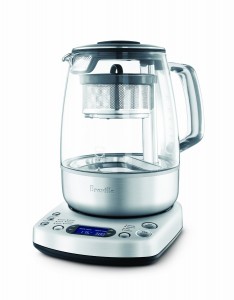The first known cup of tea was brewed nearly 4,700 years ago in China by the legendary “Medicine King,” emperor Shennong.
According to Shennong, the infused water was useful for treating a variety of conditions, including tumors, abscesses, bladder ailments, and lethargy.
Well, several millennia later, Shennong’s brew is more popular than ever, and he was right: it does have a variety of now-scientifically-proven benefits.
In this article, we’re going to look at 5 reasons why you should include this health beverage in your daily routine.
Table of Contents
+
Health Benefit of Tea #1:
Tea Helps Fight Free Radicals in the Body
“Free radicals” are atoms or groups of atoms that can, through chemical reaction, cause damage to cells in the body.
While free radicals play a vital role in certain basic physiological processes necessary for life, excessive amounts have been associated with aging, and age dependent diseases such as cardiovascular disease, cancer, neurodegenerative disorders, and other chronic conditions.
“Antioxidants” are substances that defend the body against the negative effects of free radicals. Our primary dietary sources of antioxidants are fruit and vegetables, which at least partially explains why research has shown that people who eat fruit and vegetables have a lower risk of heart disease and certain neurological disorders.
Well, as you’ve probably guessed by now, tea–and green tea in particular–is also great source of antioxidants.
It’s no surprise, then, that research has shown that regular tea consumption can reduce the risk of heart disease, and may even play a role in the prevention of cancer, as well as Alzheimer’s and Parkinson’s disease.
Furthermore, research has associated tea drinking with overall longevity. In a study of 40,530 Japanese adults, those who drank the most green tea (5 or more cups per day) were significantly less likely to die during an 11 year period.
Another study of 14,001 elderly Japanese individuals found the same: those who drank the most green tea were significantly less likely to die than those that drank the least.
Health Benefit of Tea #2:
Tea is a Brain Booster
The common commercial teas sold (black, green, and white) contain varying amounts of caffeine–14 to 61 mg per cup, according to one study, with no one type of tea generally containing more than another.
While we all know the stimulatory effects of caffeine, tea contains something else that coffee doesn’t, and that gives it the upper hand in terms of boosting cognitive function.
This is the amino acid known as theanine, and research has found that when it’s paired with caffeine, it can…
- Improve alertness, focus, attention, memory, mental task performance, and mood
- Reduce the effects of mental and physical stress
- Increase the production of nitric oxide, which improves blood flow
The theanine also moderates the effects of caffeine, giving a smoother increase in energy without the crash.
Health Benefit of Tea #3:
Tea Can Help You Lose Weight
Caffeine, found in most commercial teas, is a known weight loss aid, but green tea in particular has more to offer in this regard.
Green tea contains an abundance of antioxidants known as “catechins,” which have been shown to assist with weight loss.
There are two primary mechanisms how it does this:
- It can increasetotal daily energy expenditure (it seems to be unreliable in this mechanism, however).
- It accelerates exercise-induced fat oxidation (the breaking down of fat molecules into usable energy), by inhibiting an enzyme that degrades adrenaline (and the longer adrenaline is in your system, the more fat you burn).
Interestingly enough, research has also shown that the catechins in green tea can help reduce abdominal fat in particular,
Health Benefit of Tea #4:
Tea Improves Insulin Sensitivity
When you eat food, your pancreas releases the hormone insulin into your blood, which tells your liver, muscles, and fat tissue to take in the nutrients being pumped into your blood.
If your body is healthy, your cells are sensitive to insulin’s signal–they “listen” to it, so to speak, and suck the nutrients out of your blood.
The more sensitive your cells are to insulin, the better they respond to its signals. As insulin sensitivity increases, your body needs to produce less insulin to successfully “convince” its cells to absorb nutrients, and the job gets done quicker. This is a good thing, and helps maintain a lean, healthy body.
As cells become insulin resistant, however, they fail to respond to insulin in the ways they should. The body must then produce more insulin to force its cells into action, and the insulin must remain in the blood longer to get the cells to take the nutrients.
Insulin resistance is a bad thing, and can lead to weight gain (especially in the abdominal region), an increased risk of cardiovascular disease, high blood pressure, and more.
(And as a side note, type 2 diabetes is a condition wherein your cells have become very resistant to insulin and your body simply can’t produce enough to make them respond properly anymore. Thus, diabetics must inject insulin when they eat to strong arm their cells into accepting glucose.)
Well, yet another feather in tea’s cap is the fact that it improves insulin sensitivity.
Green tea is particularly effective in this mechanism, and regular consumption has been associated with a decreased risk of developing type 2 diabetes
Health Benefit of Tea #5:
Tea Helps Fight Harmful Bacteria and Viruses
Those wonderful little catechins found in tea also help keep you healthy.
Research has shown that these molecules have antiviral and antibacterial properties, which can not only prevent sickness, but also cavities and even bad breath.
A Note on Buying Teas
Research has shown that the older leaves used in lower quality teas contain less beneficial antioxidants and amino acids, and more fluoride.
Thus, I recommend you stay away from the cheap, powdered, bagged teas. These products are the “dregs” of the tea world, and won’t benefit you nearly as much as fresh, loose-leaf tea will.
Personally, I really like some of Teavana’s products, and Upton Tea Imports is a good resource as well. I love combining green tea with flavorful white teas.
If you’re okay with a little caffeine, stay away from defcaffeinated teas.
Research has shown that decaffeinated teas contain significantly fewer catechins than teas in their natural, caffeinated forms.
If you’re going to be making loose teas, you may also want to consider getting a contraption for proper brewing.
You can go high-tech, like this awesome tea maker from Breville (I have it and love this thing):

Or you can keep it simple and get a french press, like this one from Grosche:











